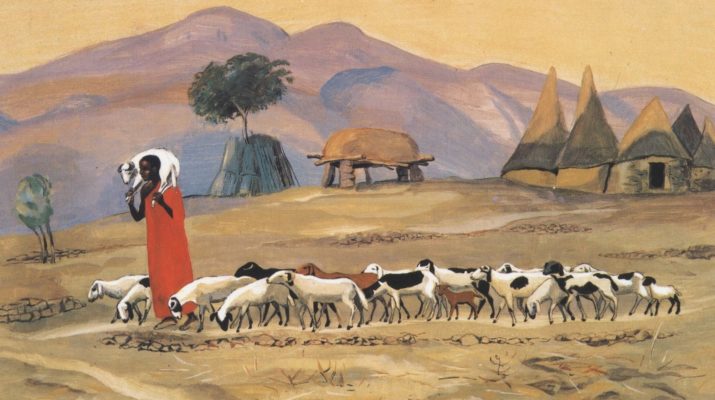Psalm 28
Of David.A
1 To you, O Lord,B I call;C
my rock,D do not refuse to hearE me,
A “David” = david. From the same as dod (beloved, love, uncle); the root may mean to boil, which is used figuratively to describe love. So, this implies someone you love such as a friend, a lover, or a close family member like an uncle. David’s name likely means something like “beloved one.”
B “Lord” = YHVH. From havah (to be, become) or hayah (to come to pass, become, be). This is the name of the God of Israel, the self-existent and eternal one, the tetragrammaton. This pronunciation has been lost to time so “Lord” is generally used in its place.
C “call” = qara. This is to call or call out – to call someone by name. Also used more broadly for calling forth.
D “rock” = tsur. From tsur (to confine, cramp, or bind in a literal or figurative sense; to besiege, assault, or distress). This is rock, tone, cliff, boulder, rocky. It can also be a refuge, a way to refer to God.
E “refuse to hear” = charash. This is to scratch, which implies etching or plowing. It can mean to manufacture regardless of materials used. Figuratively, it can be to devise or conceal. It can also have a sense of secrecy. Hence, being silent or left alone. It can also be speechless.
for if you are silentF to me,
I shall be likeG those who go down to the Pit.H
F “silent” = charash. Same as “refuse to hear” in v1. See note E above.
G “be like” = mashal. 17x in OT. From mashal (proverb, parable, taunt, discourse, maxim, adage, poem). This is to compare, speak in a proverb or riddle – to speak in allegory or liken.
H “Pit” = bor. From bur (to bore; figuratively, to explain, examine, or clear up). This is a pit – generally a cistern or dungeon. It could also be a well or fountain.
2 HearI the voiceJ of my supplication,K
as I cry to you for help,L
I “hear” = shama. This is to hear, call, consent, or consider. It implies listening intelligently, giving attention, and, because of these two factors, obedience and action are often implied.
J “voice” = qol. This is a sound, used often for human voices. Also used when God speaks or angels, animals or instruments. It can be a cry or a noise, thunder or earthquakes and so on.
K “supplication” = tachanun. 18x in OT. From chanan (beseech, show favor, be gracious; properly, to bend in kindness to someone with less status). This is entreaty, prayer, or supplication. It is looking for favor earnestly.
L “cry…for help” = shava. This is crying or shouting aloud, generally seeking freedom from some kind of trouble.
as I lift upM my handsN
toward your most holyO sanctuary.P
M “lift up” = nasa. This to lift in a broad sense, literally and figuratively. So it could be to carry, take, or arise. It could also be bring forth, advance, accept.
N “hands” = yad. This is hand, ability, power. Hand in a literal sense, but also what one can do or the means by which one does it.
O “holy” = qodesh. This is set apart and so sacred. God is different from us and so God is holy/set apart. Things we dedicate to God’s service are set apart for God and so they, too, are holy, etc.
P “sanctuary” = debir. 16x in OT. Perhaps from dabar (to speak, declare, discuss). May mean a place of speaking like an oracle. It is the inner sanctuary of Solomon’s Temple.
3 Do not drag me awayQ with the wicked,R
with those who are workersS of evil,T
Q “drag…away” = mashak. This is to draw, drag, or pull. It can mean sow, march, remove, draw along, continue, extend, or prolong.
R “wicked” = rasha. This is morally wrong so it refers to someone who is actively bad as wicked, criminal, an evil person, offender, condemned, or ungodly.
S “workers” = paal. This is to do, make, work, or accomplish. Generally refers to regularly repeated or systematic action – so, to practice.
T “evil” = aven. Root may mean panting as one does when expending a lot of energy, especially when it comes to nothing. This is nothingness, trouble, sorrow, distress, wickedness, evil, harm, sorrow, misfortune, and mischief. It is also used specifically to refer to idols.
who speakU peaceV with their neighbors,W
while mischiefX is in their hearts.Y
U “speak” = dabar. Perhaps related to “sanctuary” in v2. See note P above.
V “peace” = shalom. From shalam (to be complete or sound; to have safety mentally, physically, or extending to one’s estate; so, if these things are safe and complete, the implication is that one would be friendly; and, if being friendly, one would make amends and that friendship would be reciprocated). This is completeness, soundness, welfare, favor, friend, good health. It is to be safe and figuratively well, happy, at peace, friendly. Abstractly, it includes the ideas of welfare and prosperity (not in excessive wealth, but in having enough).
W “neighbors” = rea. From raah (to associate with). This is the same as neighbor in Leviticus 19:18 “love your neighbor as yourself.” This is friend, companion, fellow, neighbor. It is someone with whom you associate, whether more or less close.
X “mischief” = ra’. From ra’a’ (to be evil, bad, afflict; properly, to spoil – to destroy by breaking into pieces; figuratively, to cause something to be worthless; this is bad in a physical, social, or moral sense; that which displeases, to do harm or mischief, to punish or vex). This is bad, disagreeable, that which causes pain, misery, something having little or no value, something that is ethically bad, wicked, injury, calamity. This refers to anything that is not what it ought to be – a natural disaster, a disfigurement, an injury, a sin.
Y “hearts” = lebab. May be related to labab (to encourage; properly, to be encased as with fat; used in a good sense, this means to transport someone with love; used in a bad sense, it can mean to dull one’s senses). This is the heart, courage, one’s inner self, the mind, or the will. Heart is only used in a figurative sense in the Old and New Testaments.
4 RepayZ them according to their work,AA
and according to the evilBB of their deeds;CC
Z “repay” = natan. This is to give, put, set, offer. It is to give literally or figuratively.
AA “work” = poal. Related to “workers” in v3. From paal (see note S above). This is an action or deed, conduct. It is the act of working or the work itself. It can also be wages or maker.
BB “evil” = roa. Perhaps related to “mischief” in v3. 19x in OT. Perhaps from ra’a’ (see note X above). This is badness, evil, sadness, or wickedness. It could be simple ugliness, rottenness of figs, moral evil as in evil deeds, an evil heart, or sadness.
CC “deeds” = maalal. From alal (to affect, do, practice, mock, overdo, glean, abuse, pain). This is some kind of deed, action, invention or practice whether good or bad.
repay them according to the workDD of their hands;
renderEE them their due reward.FF
DD “work” = maaseh. From asah (to do, make, accomplish, become). This is a word – any action whether positive or negative. It can also be a transaction, construction, activity, property, or something that is produced.
EE “render” = shub. To turn back, return, turn away – literally or figuratively. Doesn’t necessarily imply going back to where you started from. This is also the root verb for the Hebrew word for repentance “teshubah.”
FF “due reward” = gemul. 19x in OT. From gamal (how one deals with someone whether positively or negatively – so to reward, requite; to wean or the work that goes into something ripening). This is benefit, deed, recompense. It is some treatment that is deserved or earned, whether positive or negative. It can be reward or requital.
5 Because they do not regardGG the worksHH of the Lord,
or the work of his hands,
he will break them downII and build them upJJ no more.
GG “regard” = bin. This is to discern, consider, attend to. It refers to distinguishing things in one’s mind or, more generally, to understand.
HH “works” = peullah. Related to “workers” in v3 & “work” in v4. 14x in OT. From paal (see note S above). This is work, deed, reward, or wages.
II “break…down” = haras. This is to break down, throw down, ruin, overthrow, or destroy. It is breaking down in pieces.
JJ “build…up” = banah. This is to build, make, set up, restore, repair, or obtain children. It is to build literally or figuratively.
6 BlessedKK be the Lord,
for he has heard the soundLL of my pleadings.MM
KK “blessed” = barak. This is to kneel, to bless. It is blessing God as part of worship and adoration or blessing humans to help them. It can be used as a euphemism to say curse God.
LL “sound” = qol. Same as “voice” in v2. See note J above.
MM “pleadings” = tachanun. Same as “supplication” in v2. See note K above.
7 The Lord is my strengthNN and my shield;OO
in him my heart trusts;PP
NN “strength” = oz. From azaz (to be strong, become fixed, be bold, prevail, be impudent; it means to be stout literally or figuratively. A Late Hebrew word). This is strength in the sense of force, majesty, praise, material and physical strength, the abstract notion of security. It can also speak of social or political power.
OO “shield” = magen. From ganan (to surround, cover, defend, protect). This is a shield, defense, or figuratively a protector. It can also be used for a crocodile’s hide.
PP “trusts” = batach. This is to hide for refuge, be secure or sure. Figuratively, it refers to trust, being confident, or hoping.
so I am helped,QQ and my heart exults,RR
and with my song I give thanksSS to him.
QQ “helped” = azar. This is to surround, which implies encircling to protect someone or help them out. It can also be help, ally, or support.
RR “exults” = alaz. 16x in OT. This is to jump for joy, rejoice, triumph, or be jubilant.
SS “give thanks” = yadah. This is to throw one’s hands into the air in a gesture of praise. So, it is to praise, give thanks, or make a confession.
8 The Lord is the strength of his people;
he is the savingTT refugeUU of his anointed.VV
TT “saving” = yeshuah. From yasha (to deliver, defend, help, preserve, rescue, be safe. Properly, to be open, wide or free, which implies being safe. Used causatively, it means to free). This is salvation, deliverance, health, victory, prosperity.
UU “refuge” = maoz. Perhaps related to “strength” in v7. From uz (to run for refuge, to seek safety, be strong) OR from azaz (see note NN above). This is a defense, refuge, safety, fortress, rock, strength, or stronghold. It is somewhere one goes to be safe and protected or something one uses to be safe. Figuratively, it could be a defense or a force.
VV “anointed” = mashiach. From mashach (to smear or anoint; to run oil on, to consecrate). This is the anointed or consecrated one. So, it could refer to a king, priest, or saint. It is also the root of the word “messiah.”
9 O saveWW your people,XX and bless your heritage;YY
WW “save” = yasha. Related to “saving” in v8. See note TT above.
XX “people” = am. From amam (to darken, hide, associate; creating shadows by huddling together). This is people or nation. It can be used specifically for a tribe, collectively of troops or armies, or figuratively to refer to a flock of animals.
YY “heritage” = nachalah. Related to nachal (to inherit, occupy, distribute, take as heritage). This is properly something that was inherited. It can mean occupancy generally or, more particularly, an heirloom or an estate. This can be an inheritance, gift, possession, or portion.
be their shepherd,ZZ and carryAAA them forever.BBB
ZZ “be…shepherd” = ra’ah. This is to tend a flock, pasture, or graze. It can mean to rule or to associate with someone. Figuratively, it can be ruler or teacher.
AAA “carry” = nasa. Same as “lift up” in v2. See note M above.
BBB “forever” = ad + olam. Literally “until eternity.” Olam is a long scope of time whether in the past (antiquity, ancient time) or in the future (eternal, everlasting).
Image credit: “The Good Shepherd” by the JESUS MAFA in Cameroon, 1973.




